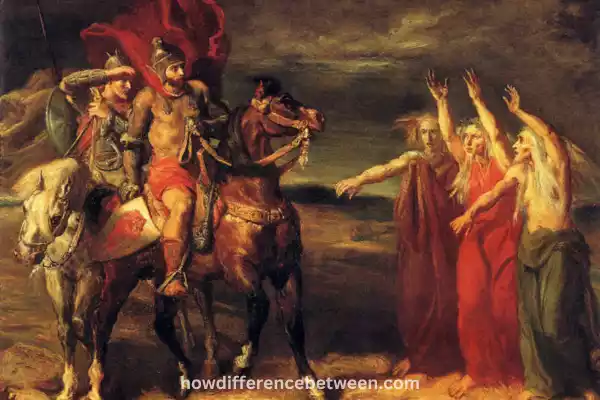Few literary characters have captured readers and theatergoers as much as Macbeth and Banquo in William Shakespeare’s Macbeth, playing key roles in its plot while possessing strikingly opposing personalities. This article analyzes their character differences as well as actions taken, relationships formed, and the overall impactful nature of the tale.
A brief overview of the play “Macbeth” by William Shakespeare
William Shakespeare wrote the tragedy “Macbeth”, which was first performed around 1606. The play is set in medieval Scotland and explores themes such as ambition, guilt, power, and the destructive effects of unchecked desire.

Macbeth is a Scottish nobleman consumed by the desire for power. He succumbs to his wife’s manipulations and the three witches prophecies. Macbeth becomes more paranoid as he rises to power through regicide. This leads to him becoming ruthless and murderous, which causes him to spiral into madness.
Other notable characters in the play include Lady Macbeth and Macduff. They all play important roles as the tragedy unfolds. The play “Macbeth”, with its poetic language and dramatic tension, is known for its psychological exploration of human nature. Shakespeare’s Macbeth is still one of his most popular plays. It explores timeless themes that continue to resonate with audiences today.
Introduction to the characters Macbeth and Banquo
Macbeth Banquo are both important characters in William Shakespeare’s “Macbeth.” Both characters play a significant role in the tragic events of the play.
Macbeth is initially presented as a loyal and brave Scottish general. However, he is a complex, ambitious character. His desire for power, and the prophecies from the three witches, propel him on a path to treachery and ruin. Macbeth’s story explores themes such as moral corruption, guilt, and the consequences that come with unchecked ambition.

Banquo is Macbeth’s loyal friend and soldier. He is shown to be honorable, courageous, and morally upright in the entire play. Banquo meets the witches along with Macbeth. However, unlike his friend, Banquo remains skeptical of their prophecies and does not act on them. Banquo is a contrast to Macbeth. He represents loyalty, integrity, and the moral compass that Macbeth slowly abandons.
The two characters have a strong bond of friendship and loyalty, as they fought together in battle. Their paths diverge, however, when they are confronted with the witches’ prophecies. Macbeth’s ambition, and his willingness to gain power at all costs, drive him to darkness. Banquo’s caution and refusal to compromise set him on a completely different path.
The different qualities and choices made by Macbeth, and Banquo influence the plot of “Macbeth” and its themes. This ultimately leads to their tragic fates.
Background Information
William Shakespeare wrote and performed “Macbeth” in the early 17th Century. The play takes place in Scotland during Middle Ages and is inspired by historical figures and events. Macbeth is also known as Thane Glams and is a respected general of the Scottish army. Three witches predict his future as Thane of Cawdor, and then King of Scotland, at the start of the play.
Macbeth is fueled by his ambition and begins to consider regicide to seize the Scottish throne. Macbeth’s character changes as he delves deeper into his dark desires. This is characterized by guilt, paranoia, and moral degradation.
Banquo, Macbeth’s loyal friend and fellow general, is also confronted by the witches. He receives a prophetic message. The witches claim that Banquo’s descendants would inherit the Scottish throne in the future, which implies a royal lineage. Banquo, unlike Macbeth, does not believe the witches or actively follow their prophecies. Banquo is the moral opposite of Macbeth. He embodies integrity, reason, and loyalty to the rightful ruler.
Macbeth’s relationship with Banquo begins as one of trust and camaraderie. They show their loyalty and bravery by fighting together against foreign invaders and rebels. As the play continues and Macbeth is consumed by his ambitions, their friendship becomes strained and eventually shattered.
Macbeth’s character and Banquo’s serve as contrasting figures in the play. They highlight themes such as ambition, morality, and the consequences of choices. Macbeth’s descent into the darkness and Banquo’s unwavering noblesse provide a powerful examination of the human mind and the corrupting effect of unchecked desire.
Differences Between Macbeth and Banquo
These differences are responsible for the different paths taken by the characters and their outcomes:
- Ambition: Macbeth’s ambition is to be king and gain power. He is easily swayed and consumed by the idea of being king. Banquo, on the other hand, is cautious and doesn’t let ambition cloud judgment. He does not believe the witch’s prophecies, and he doesn’t actively pursue them. Instead, he chooses to be loyal to his King and maintain his integrity.
- Macbeth’s Moral Compass: Macbeth’s moral compass is a major factor in the dramatic decline of his character. He becomes more power-hungry and is willing to commit regicide, engage in violence and deception, and further acts to ensure his position as King. Banquo, on the other hand, maintains a moral compass that refuses compromise. Even when tempted by the prophecies of the witches, he remains loyal to his friend the rightful King.
- Character Development: Macbeth undergoes a profound change from a valiant and noble warrior to a ruthless, tyrannical leader. He is driven mad by guilt and paranoia. Banquo, on the other hand, remains consistent throughout the play. Even in the face of adversity, he maintains his loyalty, integrity, and rationality.
- Fate and Legacy: The fates of Macbeth, Banquo, and others are very different. Macbeth is ultimately killed by his actions, which are a result of his ambition and immoral acts. Banquo, on the other hand, is doomed by the witch’s prophecy stating that his descendants would inherit the throne. Banquo’s legacy is carried on by his son Fleance who manages to escape the assassins. Banquo’s descendants fulfill the prophecy at the end of the play, adding a layer of complexity.
The differences between Macbeth, Banquo, and other characters in the play help to explore themes like ambition, morality, and the corruption of power. Their different character traits and decisions highlight the dangers of unchecked ambition, and the importance to maintain one’s moral compass.
Consequences of their choices
Shakespeare’s “Macbeth”, in which Macbeth and Banquo make choices that have profound consequences, will ultimately determine their fate:
- Macbeth’s Actions and Their Consequences a. Regicide & Usurpation: Macbeth’s decision to kill King Duncan to take the throne had far-reaching effects. This sets in motion a series of events that leads to Macbeth’s moral degeneration and the destabilization of the kingdom. b. Macbeth suffers from guilt and paranoia after committing regicide. He is also plagued with hallucinations, visions, and other forms of haunting. His conscience causes him to suffer, resulting in a worsening of his mental state and an increase in paranoia. Macbeth commits more violent acts to maintain his power. He orders the murder of Banquo’s family and Macduff. This further alienates him from other people and seeds his demise. Macbeth’s brutal actions undermine trust and loyalty in those around him. His actions cause his allies to turn on him and lose their support.
- Banquo’s fate and legacy: Loyalty and threat: Banquo’s loyalty to Duncan, the rightful monarch, is a potential danger to Macbeth. Banquo’s refusal to take part in Macbeth’s corrupt activities and his integrity creates a stark contrast. b. Macbeth murders Banquo because he fears that Banquo’s descendants could be a threat to Macbeth’s dynasty. Banquo is murdered, but his son Fleance escapes. This fulfills the witch’s prophecy, that Banquo’s descendants will one day ascend to the throne. Banquo’s Ghost: Banquo appears at the banquet to haunt Macbeth, exposing his guilt. This supernatural manifestation reminds Macbeth of the consequences of his actions and increases his paranoia.
Macbeth’s decisions lead to his moral corruption, loss of trust and support as well as mental anguish, and ultimately, his downfall. Banquo, on the other hand, despite his murderous actions, is a symbol of loyalty and moral integrity that contributes to the fulfillment and restoration of Scotland’s rightful rule.
Ambitions and Motivations
William Shakespeare’s “Macbeth”, a play about Macbeth, is shaped by the ambitions and motives of Macbeth:
- Macbeth’s Ambitions:
- Desire for power: Macbeth is driven by his insatiable desire for power. He is initially intrigued by the idea that he could become king when he hears the prophecies of the witches. The ambition he has to become king consumes him and is the reason for his actions in the play.
- External Influences: Lady Macbeth encourages Macbeth to take drastic actions to fulfill prophecies. Her ambition and desire for power influence him, and he commits regicide to secure the throne.
- Fear of Fate and Regret: Macbeth is also motivated by his fear of the future and regret. He fears that he will miss the chance to gain power and believes that the witch’s prophecies are inevitable. The fear of regret and disappointment in his past life also drives him to act, even if that means using immoral methods.
- Banquo’s Ambitions:
- Loyalty and Honor: Banquo is motivated by his loyalty and honor. Even when faced with prophecies that Banquo will be the father of a dynasty of kings, he remains dedicated to serving the King and maintaining his Integrity. Banquo’s moral code drives him to put loyalty and honor before personal gain.
- Skepticism, caution: Banquo is more cautious and skeptical than Macbeth when it comes to the prophecies. He doubts the reliability and motives of the witches and is hesitant to take action based on their predictions. Banquo’s motives are grounded in a desire for moral integrity and rationality.
- Concern for Future Generations: Banquo is also motivated by the future and well-being of his descendants. He knows that his actions will have an impact on his descendants and his legacy. Banquo’s loyalty to the king ensures that his family can potentially regain their rightful rulership in the future.
Macbeth is motivated by an unrelenting desire for power. This is fueled by external influences, fear, and the need to avoid regret. Banquo, on the other hand, is motivated by loyalty, honor, and skepticism. He also has a concern about future generations. The divergent ambitions of Macbeth and Banquo’s motivations are what lead to their contrasting paths throughout the play.
Interaction with the Witches
Shakespeare’s “Macbeth” has Macbeth and Banquo interact with the witches, which has a significant impact on their characters and events.
- Macbeth and the Witches:
- Prophecies: Macbeth meets the witches in the heath where they give him a series of prophecies. The witches hail him as Thane of Glamis and Thane Cawdor. They also proclaim that he will be the future King of Scotland. These prophecies fuel Macbeth’s ambition for power and ignite his ambition.
- Temptation and influence: The prophecies of the witches act as catalysts, tempting Macbeth into considering regicide and seizing the throne. Their words sow the seeds of ambition and lead him down the path of evil. The witches represent the supernatural forces that influence Macbeth and manipulate his psyche.
- Additional prophecies: In later meetings, the witches offer Macbeth more predictions which both encourage him and mislead him. They give him a false sense that he is safe, which leads to his demise.
- Banquo’s interaction with the Witches
- Banquo: Macbeth’s companion when they meet the witches in the heath. He is present when Macbeth receives the prophecies. One of them predicts that Banquo will have descendants who become kings. Banquo is intrigued and suspicious by this revelation.
- Banquo warns: Macbeth about the deceptive nature of witches’ predictions. He realizes that witches can use manipulation and half-truths to further their own goals.
- Temptation and Moral Conflict: Banquo, despite his skepticism is briefly tempted by the prophecies made by the witches about his future lineage. He chooses to ignore the predictions to maintain his moral integrity and his loyalty to his king.
Banquo and Macbeth take different paths because of their interactions with the witches. Banquo is adamant about his morals and skepticism, while Macbeth gives in to the witches’ manipulation and temptations. The witch’s prophecies are catalysts in the tragedy. They drive Macbeth to ambition, leading him to a dark path. Banquo’s refusal to be influenced by their influence highlights his loyalty, integrity, and resistance to temptation.
Actions and Consequences
Shakespeare’s “Macbeth”, a play about ambition, power, and moral responsibility, explores themes such as the actions and consequences of Macbeth, Banquo, and their effects.
- Macbeth’s Actions and Their Consequences
- Regicide: Macbeth’s decision to kill King Duncan to fulfill the Witches’ prophecy set into motion a tragic series of events. This regicide brings Macbeth the crown, but it also sets off a spiraling of guilt, paranoia, and moral degradation.
- Tyranny and Violence: Macbeth becomes more violent and tyrannical as he consolidates his power. He murders Banquo’s family and Macduff, which further intensifies his descent into brutality and cruelty.
- Manipulation of Others: Macbeth manipulates others for his ends. He manipulates Macduff’s parents and convinces them to murder Banquo. Macbeth’s ambition and guilt lead to his demise. His internal torture, hallucinations, and sleeplessness drive him to despair, while his tyrannical rules alienate his supporters, leading to rebellion.
- Banquo’s actions and consequences:
- Loyalty and Caution: Banquo’s main action is to show his loyalty and caution to Duncan the King, as well as his commitment to maintaining moral integrity. He is a contrast to Macbeth because he is always cautious when it comes to the witch’s prophecies and their possible consequences.
- Banquo warns: Macbeth against trusting witches, and tells him not to fall for their lies. When Macbeth becomes king, he suspects foul play and is suspicious of the actions of his friend.
- Murder and Escape: Banquo’s tragic fate is changed when Macbeth orders him to be murdered. His noble character is maintained by his refusal to compromise his integrity. Banquo’s son Fleance can escape, confirming the witch’s prophecy that Banquo’s descendants would become kings.
Macbeth’s actions have several consequences, including a moral decline and guilt. They also lead to a tyrannical regime, his downfall, and a paranoid rule. Banquo’s actions result in his murder. His legacy is carried on by his son, who fulfills the prophecies of the witches. The play examines through their actions and consequences the destructive nature of unchecked ambitions, the price of compromising morals, and the repercussions of immoral acts.
Loyalty and Betrayal
Shakespeare’s “Macbeth” is replete with themes of loyalty and betrayal that influence the relationships and actions of many characters, such as Macbeth and Banquo.
- Loyalty:
- Loyalty towards King Duncan: Both Macbeth and Banquo show loyalty to King Duncan at the start of the play. As brave and respected soldiers, they serve him with loyalty. Macbeth’s loyalty to the King is praised at first, while Banquo’s commitment to Duncan can be seen in his words and actions.
- Loyalty and friendship: Macbeth, and Banquo have a strong bond forged by their common experiences on the battlefield. Banquo is loyal to Macbeth and supports him. Banquo’s loyalty is shown when he refuses to believe the witch’s prophecies and instead urges caution. Banquo’s loyalty is extended to his moral principles. He does not compromise his morals or take part in Macbeth’s immoral acts. Banquo’s loyalty is in stark contrast with Macbeth, who has slid into treachery.
- Betrayal:
- Macbeth betrays King Duncan: This is one of the pivotal moments in the play. Macbeth is driven by ambition to murder Duncan, who was a guest at his castle. Macbeth’s regicide represents a betrayal and a breach of trust since he violates both his duties as a host and a subject.
- Betrayal of Friendship: Macbeth betrays his friendship with Banquo because of his ambitions. Banquo is seen as a possible threat to Macbeth’s reign. He orders his murder to remove any obstacle to his power. This betrayal breaks their once close bond and shows Macbeth’s ruthless pursuit of self-interest.
- Betrayal of Moral Principles: Macbeth betrays his moral principles in the actions he takes. He gives in to his ambition and ignores the moral code which should guide him. Macbeth’s betrayal leads to guilt and isolation. It also results in a loss of humanity.
The play shows the consequences of both loyalty and betrayal. Betrayal is associated with the destruction of moral values and unchecked ambition. Loyalty, on the other hand, is linked to honor, integrity, and trust. Macbeth’s betrayal and Banquo’s loyalty serve as a commentary about the impact of such actions on relationships and individual well-being.
Influence on Other Characters
Macbeth’s and Banquo’s characters have an important influence on the other characters in Shakespeare’s “Macbeth,” influencing their decisions, actions, and relationships.
- Macbeth’s Influence:
- Lady Macbeth: Macbeth’s ambitions and actions have a profound impact on Lady Macbeth. She shares his ambitions and encourages him to seek the crown by regicide. Lady Macbeth is driven to manipulate and exert relentless pressure on Macbeth for him to achieve his goals.
- The Murderers: Macbeth extends his influence to the killers he hires for Banquo and Macduff’s family. He manipulates their fears or appeals to their loyalty and personal gain to convince them to commit these brutal acts. Macbeth’s rule as a tyrant has a profound effect on the nobles and allies around him. Others turn against him when they see his descent into tyranny. Macbeth’s acts contribute to the erosion of trust and loyalty of those who once supported him.
- The Witches: While the Witches influence Macbeth initially with their prophecies and actions, their perceptions of him are shaped by his subsequent acts. Macbeth’s decisions solidify his position as a pawn in fate. This further influences the witches and their interactions with him.
- Banquo’s influence:
- Macbeth: Banquo is a moral guide and source of conflict because of his presence and interactions with Macbeth. Banquo’s loyalty, integrity, and morality are in stark contrast with Macbeth’s ambitions. Macbeth’s guilt, paranoia, and fear are increased by Banquo remaining in his life. Banquo is represented at the banquet as a ghost.
- Fleance: Fleance is Banquo’s child, and represents potential as well as a threat to Macbeth. Fleance, who survived Banquo’s death, is a symbol of Banquo and of the fulfillment of the prophecy of the witches. Banquo’s legacy can be seen in events beyond the timeline of the play.
- The Witches: Banquo’s interactions and dialogue with the witches influence their perception of him. Banquo’s caution and skepticism towards the witches’ prophecies contrast with Macbeth, who is willing to accept them. Banquo’s influence over the witches highlights his moral character and his resistance to manipulation.
Macbeth’s and Banquo’s influence on other characters is a reflection of the themes explored in the play, such as loyalty, ambition, power, and moral responsibility. Their choices and actions have a ripple effect on the lives of others, forming alliances and driving conflict.
Fate and Prophecies
Shakespeare’s “Macbeth” plays a major role in the themes of destiny and prophecies. They influence the actions, motives, and beliefs of all the characters.
This includes Macbeth and Banquo:
- Fate: Predetermined Events:
- Predestined Events: The concept is introduced by the witch’s prophecies. They imply that some events are predetermined or inevitable. Macbeth, who is initially skeptical, becomes more convinced that he will become king and takes drastic measures to achieve the prophecies.
- Manipulation by Supernatural Forces: Supernatural forces manipulate characters by manipulating their beliefs and actions. They seem to control the characters’ destinies. Macbeth is a puppet to fate. He is manipulated by the witch’s prophecies, and cannot escape the consequences of the choices he makes.
- The tragic destiny: According to the play, Macbeth’s tragic fall is due to his efforts to alter or defy his fate. He is ultimately trapped by his actions and unable to alter the destiny set.
- Prophecies:
- Catalyst of Ambition: Macbeth’s desire for power is sparked by the prophecies made by the witches. They fuel his desire for power, and they influence his decisions all through the play. Macbeth’s belief in prophecies fuels him to control his fate and leads him down the path of destruction.
- Moral Dilemma & Suspicion: Banquo remains skeptical after hearing the witch’s prophecies. He is suspicious of the witches’ motives and their predictions, realizing the possibility of deception and manipulation. Banquo’s suspicions create a moral quandary as he weighs the consequences and implications of accepting the prophecies.
- Irony and deception: The characters often interpret the prophecies in a way that is misleading or deceiving. Macbeth is misled by the prophecies, which leads him to act in a way that will ultimately lead to his demise.
- Partial Fulfillment: The prophecies are partially fulfilled, which makes the characters believe that they are accurate. Partial fulfillment is exemplified by Macbeth’s rise and Banquo’s being told his lineage. Their interpretations and actions show the characters’ agency to shape the outcome.
Macbeth’s exploration of destiny and prophecies raises important questions about human agency and the influence of supernatural forces on the lives of the characters. The prophecies may act as catalysts to drive ambition and action, but ultimately the characters are responsible for the choices they make and the results that result. The play explores the complex relationship between fate and free choice while highlighting moral dilemmas, ironies, and tragic outcomes that result from the characters’ interactions with the prophecies.
Legacy and Impact
Macbeth’s legacy and the impact of Banquo in Shakespeare’s “Macbeth”, extends beyond their lives, and resonates with themes of power and ambition as well as moral responsibility.
- Macbeth’s Legacy and Impact:
- Tragic Figure: His story serves as an example of the destructive power of ambition. His descent into tyranny, and the consequences of those actions, leave a lasting impression on the audience. They highlight the tragic consequences that come with giving in to your desires.
- Moral Decay, Corruption: Macbeth’s choices and actions have a corrupting effect on the world. As a tyrant, Macbeth’s reign creates chaos and instability as moral principles and the natural order are ignored. Macbeth represents the darkness and moral vulnerability that exists within each individual. His story explores human ambition, manipulation, and the internal battle between good and bad.
- Banquo’s legacy and impact:
- Symbol of Integrity: Banquo is a symbol of integrity because of his unwavering loyalty and moral integrity. He also resists temptation. His character is a contrast to Macbeth and highlights the importance of moral values and the consequences that come with compromising them.
- Legacy of Prophecy: Banquo’s family lineage is significant beyond his life, according to the witches. Fleance represents his noble lineage and the fulfillment of the prophecy of the witches highlights the influence and power of fate.
- Influence on Macbeth: Banquo’s influence on Macbeth is a constant reminder to Macbeth of his guilt and moral decay. The presence of Banquo’s ghost at Macbeth’s banquet intensifies Macbeth’s internal turmoil, showing the impact Banquo’s character has had on Macbeth’s psyche.
Shakespeare’s larger themes are highlighted by the legacy and impact Macbeth has on Banquo. Macbeth is a warning about the consequences of unchecked desire, while Banquo’s moral integrity and his resistance to temptation are a contrast. Their stories are a hit with audiences because they highlight the complexity of human action, the consequences of decisions, and the enduring impact of characters that embody basic human traits and struggles.
Similarities Between Macbeth and Banquo
Although Macbeth is a distinct character in Shakespeare’s “Macbeth,” he and Banquo share some similarities, especially in their early portrayals and their encounters with the supernatural.
Here are some of the key similarities between Macbeth, Banquo, and other characters in Shakespeare’s “Macbeth”:
- Brave Warriors: Macbeth as well as Banquo were initially portrayed in the play as respected and brave warriors within King Duncan’s Army. They have shown courage and skill in the battlefield.
- Encounter with the Witches: Macbeth and Banquo meet the three witches on the heath. Both Macbeth and Banquo hear the prophecies of the witches that predict their futures. Macbeth will rise to power, while Banquo’s descendants will become kings. This shared experience binds them together and sets the stage for the events to unfold.
- Initial Skepticism: Both Macbeth and Banquo initially scoff at the witches’ prophecies. Macbeth’s curiosity and ambition are sparked, but Banquo is cautious and questions why the witches made the predictions.
- Ambition: Banquo is also ambitious, hoping to see his descendants become kings. Banquo’s ambition, however, is moderated by his moral integrity and he does not actively pursue the prophecies.
- Moral Characters: Macbeth, Banquo, and other characters are shown to be morally upright at the beginning of the play. They are loyal to King Duncan and have a strong sense of honor. Their paths diverge, however, as Macbeth is driven by his ambitions and moral decay while Banquo remains loyal to his principles.
- Influence on Play’s themes: Both characters explore themes like ambition, fate, and consequences of actions. Their differences and similarities provide contrasting perspectives and insights into human nature.
Macbeth’s and Banquo’s fates may be different, but their shared early experiences and similarities with the supernatural are crucial in setting the theme of the play. They also help to shape the story.
Conclusion
Shakespeare’s “Macbeth” is a play that centers on Macbeth and Banquo. Their contrasting traits, choices, and interactions influence the plot. Banquo is loyal, skeptical, and has integrity. Macbeth, on the other hand, is driven by ambition, which leads to moral decay.
Both characters, despite their differences, are influenced and shaped by the supernatural. They also encounter witches and wrestle with prophecies about their futures. Their actions affect other characters and themes.































